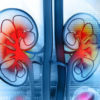Acid Reflux Treatment in Northern New Jersey
Many people have experienced the uncomfortable feeling of heartburn after eating spicy or heavily processed foods. Certain foods can cause stomach acid to flow up into the esophagus, a process known as acid reflux. At Bergen Medical Associates in New Jersey, patients with acid reflux can be diagnosed and treated by an experienced gastroenterologist. Learn more about what causes acid reflux and how patients can manage it.
What Is Acid Reflux?
When a person swallows food, a muscle at the bottom of their esophagus relaxes, allowing the food to move down into the stomach where it is broken down. If this muscle, the esophageal sphincter, does not contract properly, acid reflux can occur.
Technically, acid reflux is the mechanism that causes heartburn, although these terms are often used interchangeably. A patient with chronic acid reflux may develop gastroesophageal reflux disease (GERD). Left untreated, long-term GERD can lead to more serious conditions such as esophagitis or esophageal cancer.
What Are the Symptoms of Acid Reflux?
Aside from recurring heartburn, patients with acid reflux or GERD may experience symptoms such as:
- Chest pain
- Sore throat
- Coughing
- Difficulty swallowing
- Regurgitation of food
- Feeling like food is “stuck” in the throat
- Vomiting
If a patient experiences symptoms of acid reflux two or more times a week, they may have GERD. It’s estimated that GERD affects about a fifth of the U.S. population.
What Are the Risk Factors for Acid Reflux?
While occasional heartburn is common, certain risk factors increase a patient’s likelihood of developing GERD. These include:
- Age: The risk for GERD increases after age 40.
- Pregnancy: Women are more likely to develop chronic acid reflux when they are pregnant.
- Lifestyle factors: Patients who eat large meals or regularly eat late at night may be more susceptible to GERD. Smoking and obesity also can aggravate acid reflux.
- Other medical conditions: Patients with conditions such as scleroderma, celiac disease, and chronic obstructive pulmonary disease (COPD) are at higher risk of GERD. Patients with asthma are also more likely to have acid reflux.
- Medications: Certain prescription drugs can trigger acid reflux, as well.
How Is Acid Reflux Diagnosed?
To determine if a patient has acid reflux or GERD, their doctor will begin by reviewing their symptoms and complete medical history. Diagnostic tests may include:
- Imaging: An X-ray of the esophagus and stomach can check for esophageal strictures or other abnormalities. The patient swallows a liquid with contrast dye or a barium pill so that the X-rays can capture images.
- Upper endoscopy: This test uses a thin, flexible tube with a camera attached to examine the lining of the esophagus and stomach. During an endoscopy, a doctor can also biopsy tissue for further testing.
- Esophageal pH test: This test uses a catheter or pH probe to measure how often stomach acid enters the esophagus and how long it remains there. The patient wears a monitor to track information about their symptoms, diet, and sleep.
Are There Treatment and Lifestyle Changes?
Both GERD and occasional acid reflux can be treated with over-the-counter medications and dietary changes. The following practices can help reduce symptoms of GERD:
- Avoid spicy, fried, and high-fat foods.
- Eat smaller amounts throughout the day instead of three large meals.
- Maintain good posture while eating and avoid lying down right after eating.
- Wear loose-fitting clothing to avoid constricting the stomach.
- Stay at a healthy weight by exercising, eating a balanced diet, and enrolling in a weight management program if needed.
- Keep track of foods that trigger acid reflux and try to avoid those. While fatty and spicy foods are common triggers, others include alcohol, coffee, carbonated beverages, and acidic foods like tomatoes and citrus fruits.
Some patients use prescription medications if over-the-counter medicines do not relieve GERD symptoms. These medications can neutralize stomach acid, decrease acid production, and help heal esophageal tissue. If a patient has severe and persistent GERD that does not respond to medication, they may be a candidate for surgery. Several minimally invasive surgical procedures can help tighten the lower esophageal sphincter to reduce or prevent reflux.
Choose Bergen Medical Associates for Gastroenterology Care in Northern New Jersey
Although acid reflux is common, patients do not have to live with painful and disruptive symptoms. The board-certified gastroenterology team at Bergen Medical Associates in New Jersey works with each patient to develop an effective treatment plan for managing acid reflux or GERD. To speak with an experienced gastroenterologist at Bergen Medical Associates, request an appointment today.










